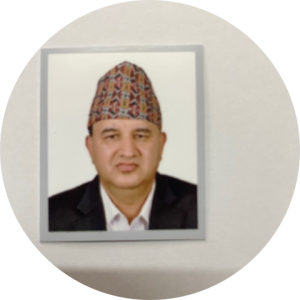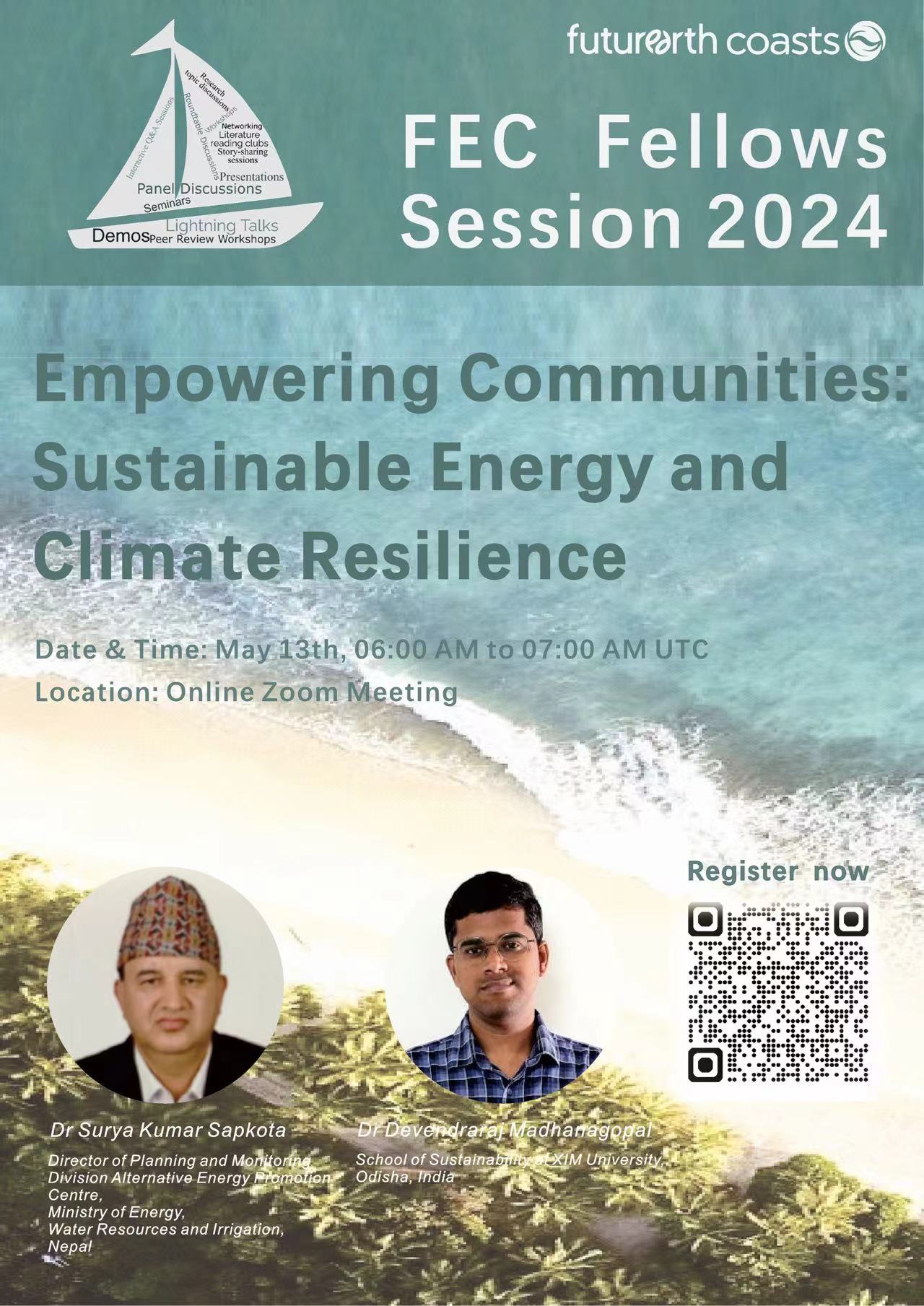Empowering Communities: Sustainable Energy and Climate Resilience
- Local Adaptation to Climate Change in South India: Challenges and the Future in the Tsunami-hit Coastal Regions
Dr. Devendraraj Madhanagopal, School of Sustainability at XIM University (Odisha, India)
This presentation critically discusses the vulnerabilities and local adaptation actions of the traditional marine fishers of the tsunami-hit coastal regions of South India to climate change and risks, with an emphasis on their local institutions. Thereby, it offers a comprehensive account of the ways in which marine fishers live and respond to climate change. The Coromandel coastal regions of South India are known for their rich sociocultural history and enormous marine resources, as well as their long history of vulnerability to climate change and disasters, including the 2004 tsunami. By drawing cases from the tsunami-hit Pattinavar fishing villages of this coast through rigorous fieldwork, this presentation demonstrates that indigenous knowledge systems, climate change perceptions, sociocultural norms, and governance systems of the fishers influence and contest the local adaptation responses to climate change. Underlining that adaptation to climate change is a socio-political process, this presentation explores the potentials, limits, and complexities of local adaptation actions of marine fishers of this coast and offers novel insights and climate change lessons gleaned from the field to other coasts of India and around the world.
- Analysis of Small-Scale Renewable Energy Options for Electricity Supply in Coastal Areas
Dr Surya Kumar Sapkota, Director of Planning and Monitoring Division Alternative Energy Promotion Centre, Ministry of Energy, Water Resources and Irrigation, Nepal
In this presentation, Dr Surya Kumar Sapkota will discuss various aspects including the selection and prioritization of key barriers for deploying small-scale renewable energy technologies (RETs) in coastal areas, conducting a techno-economic assessment of off-grid hybrid small-scale renewable energy systems for electricity supply in these regions, evaluating the sustainability of existing off-grid hybrid small-scale renewable energy systems through a case study, and concluding with recommendations based on his findings.
Our speakers
 Trained as an environmental sociologist, the academic expertise and research interests of Devendraraj Madhanagopal cut across coastal governance, marine fishing communities, coastal livelihoods, environmental politics, social and political dimensions of climate change, environmental justice, and climate justice. He holds a Ph.D. in Sociology from the Department of Humanities and Social Sciences, Indian Institute of Technology Bombay (Mumbai, India). Since 2019, he has been a faculty member associated with the School of Sustainability at XIM University (Odisha, India). He is the author of a book monograph with Routledge, UK, and he is the lead and corresponding editor of three edited books published by Springer Nature and Routledge. He, along with his co-author based in China, has recently signed a contract with Springer Nature for a co-authored book, and they are working on its publication for 2024. Devendraraj is the recipient of more than a dozen international travel grants or competitive fellowships. From August 2023 onwards, he serves as an Editorial Advisory Board Member to the SAGE Journal, “Alternatives: Global, Local, Political” [ISSN: 0304-3754; Online ISSN: 2163-3150]. He continues actively collaborating with Asian Scholars, particularly scholars based in China.
Trained as an environmental sociologist, the academic expertise and research interests of Devendraraj Madhanagopal cut across coastal governance, marine fishing communities, coastal livelihoods, environmental politics, social and political dimensions of climate change, environmental justice, and climate justice. He holds a Ph.D. in Sociology from the Department of Humanities and Social Sciences, Indian Institute of Technology Bombay (Mumbai, India). Since 2019, he has been a faculty member associated with the School of Sustainability at XIM University (Odisha, India). He is the author of a book monograph with Routledge, UK, and he is the lead and corresponding editor of three edited books published by Springer Nature and Routledge. He, along with his co-author based in China, has recently signed a contract with Springer Nature for a co-authored book, and they are working on its publication for 2024. Devendraraj is the recipient of more than a dozen international travel grants or competitive fellowships. From August 2023 onwards, he serves as an Editorial Advisory Board Member to the SAGE Journal, “Alternatives: Global, Local, Political” [ISSN: 0304-3754; Online ISSN: 2163-3150]. He continues actively collaborating with Asian Scholars, particularly scholars based in China.
 Dr. Surya Kumar Sapkota serves as the Director of the Planning and Monitoring Division at the Alternative Energy Promotion Centre, Ministry of Energy, Water Resources and Irrigation, Nepal. With expertise in renewable energy policy and planning, his role entails formulating short and long-term strategies, crafting renewable energy policies, and devising annual work plans and budgets for the sector. Dr. Sapkota also oversees the implementation, monitoring, and evaluation of various renewable energy projects and programs, while spearheading the development of environmental and social safeguards policies. Additionally, he plays a pivotal role in designing project frameworks, establishing monitoring and evaluation guidelines, and conducting comprehensive third-party analyses.
Dr. Surya Kumar Sapkota serves as the Director of the Planning and Monitoring Division at the Alternative Energy Promotion Centre, Ministry of Energy, Water Resources and Irrigation, Nepal. With expertise in renewable energy policy and planning, his role entails formulating short and long-term strategies, crafting renewable energy policies, and devising annual work plans and budgets for the sector. Dr. Sapkota also oversees the implementation, monitoring, and evaluation of various renewable energy projects and programs, while spearheading the development of environmental and social safeguards policies. Additionally, he plays a pivotal role in designing project frameworks, establishing monitoring and evaluation guidelines, and conducting comprehensive third-party analyses.
The event is free to attend and open to all. It will take place at 06:00 AM to 07:00 AM UTC on May 13th.
Or Scan the QR code below to register:


